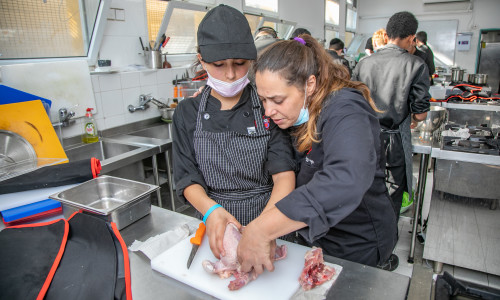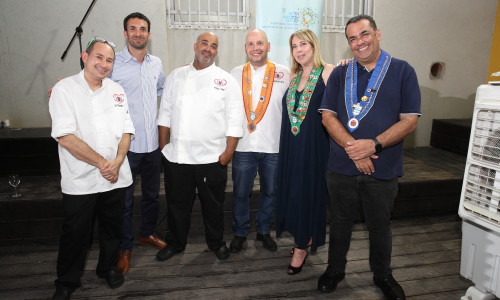Israeli Cooking School
Background
Creating a cooking school within the Bailliage d'Israel has been a project of Mrs Tami Lancut Leibovitz, Bailli Délégué, and long-time member of the Chaîne, for years. While she supports the values of the Chaîne, she felt that something was missing in her Bailliage, namely the contribution and social responsibility to her local community, and more specifically the assistance to underprivileged young people.
This ambitious project found its place within the ACCR, which support financially and helps develop initiatives around culinary education.
After a year and a half of reflection, meetings and research, Tami finalized her project.
Location and support
Finally, after a long process, one of the Baillage members established contact with the Department of Support for Children and Youth at Risk, which, under the auspices of the Tel Aviv Elementary Education Department, opened the doors of a kitchen in a center that could accommodate the school.
They also agreed to select students in needs for the training.
Thanks to generous contributions from the Orenstein Foundation, and from individuals, the purchase of everyday products had been financed.
Finally, this initiative was presented to ACCR, Karim Henein - Chaif or the Accr, and his committee, who unanimously agreed to support the Israeli Bailliage's Cooking School.
School mission statement
Providing basic tools for working in the kitchen, and learning the cooking techniques and concepts suitable for any cuisine.
Success Metrics:
At least 70% accreditation
At least 50% will find professional cooking position.
High satisfaction amongst the course participants
Note: The whole operation is running in the middle of Covid 19 pandemic and still after completion of two rounds (the third one is currently running) we achieved 80% accreditation and the 50% placement.

Student's selection process
Department for the Advancement of Children & Youth at Risk, under the Department of Elementary Education, at the Tel Aviv Municipality before each term are searching for us candidates based on some metrics we give them and their involvement and database and knowledge about Children & Youth at Risk.
Then an interview session or two with our management team is taking place (around 40 candidates) with a goal of 12 to max 14 new students to be admitted.
Course structure
Classes are held once a week for 6 months
During the course, students learn the basic techniques of any kitchen Blanching, steaming, braising, sautéing, sweating, glazing, frying, roasting, poaching, boiling, broiling, baking. Basic kitchen hygiene, handling of basic tools.
Although the average age of admission is 16, students are treated in the same manner as cooks studying in professional cooking schools.
Students do not work with recipes - they learn by watching the chef explain his methods and techniques.
At the end of each class, each student presents his work to the Chef.
The course concluded with exam (written & practical), often culminating in a graduation and gala evening.
Additional community support and homework
During the course and up to date we are in constant communication with all the graduates via a WhatsApp group that includes Instructors managers and graduates.
Additional practice is done with the help the Orenstein Foundation by sending every weekend raw materials to the student’s home needed to cook and prepare dinner based on the currents session. Chef Michael Katz is helping them through the WhatsApp group and giving additional scores for the graduation based on photos sent.


